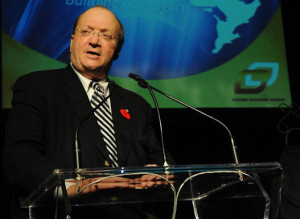Now here’s something you don’t see very often — a Tory defending unions and praising their role in the economy.
Granted, the Tory in question is a Red Tory, a veteran of the Mulroney years and Ontario PC Premier Bill Davis’ government in the 1970s and 1980s.
All the same, Tory Senator Hugh Segal — who announced his retirement from the Senate on Thursday — gave the Harper government something of a lesson on the long-standing, historical support Canadian Tories have given unions — until recently, that is.
“My Canada is the kind of country where trade unions and free collective bargaining makes our economy stronger and Canada a better place,” Segal told the told the Ontario Regional Council of Canada’s newly-formed mega-union, Unifor, last week.
“It is as important a part of a strong and growing economy as capital investment, reasonable profits and fair wages,” Segal continued.
“And without collective bargaining, there’s never any guarantee on the fair wages, and without fair wages, we’re not building a society of which we can be proud.”
Segal noted that the right to unionize was part of Conservative policy in Canada “less than five years after Confederation … This is part of who we are as Canadians from the very beginning.”
Segal’s speech comes as the Tories head towards what appears to be a major conflict with Canada’s public service unions. Eighteen labour groups representing federal workers announced this week they are taking the federal government to court over changes to labour laws buried in this year’s omnibus budget bill.
The unions say the budget effectively undermines the right to collective bargaining, and could put workers in danger by allowing the government, without review, to dismiss employees who refuse dangerous work.
The Conference Board of Canada recently predicted a “volatile” year for labour relations in 2014, because of “an acrimonious labour relations environment.”
The Board notes that half a million public service workers will be involved in collective bargaining next year.
“The union movement sees legislative attempts to restrict bargaining rights, intervention in labour disputes, and efforts to overhaul long-standing benefits — such as sick leave — as attacks on public servants," the Conference Board’s Karla Thorpe said in a statement.
"Especially in the public sector, the bargaining tone may be more negative and unions less willing to compromise.”
Segal plans to retire from the Senate next June, and will take up a position as head of Massey College at the University of Toronto.
Original Article
Source: huffingtonpost.ca/
Author: The Huffington Post Canada
Granted, the Tory in question is a Red Tory, a veteran of the Mulroney years and Ontario PC Premier Bill Davis’ government in the 1970s and 1980s.
All the same, Tory Senator Hugh Segal — who announced his retirement from the Senate on Thursday — gave the Harper government something of a lesson on the long-standing, historical support Canadian Tories have given unions — until recently, that is.
“My Canada is the kind of country where trade unions and free collective bargaining makes our economy stronger and Canada a better place,” Segal told the told the Ontario Regional Council of Canada’s newly-formed mega-union, Unifor, last week.
“It is as important a part of a strong and growing economy as capital investment, reasonable profits and fair wages,” Segal continued.
“And without collective bargaining, there’s never any guarantee on the fair wages, and without fair wages, we’re not building a society of which we can be proud.”
Segal noted that the right to unionize was part of Conservative policy in Canada “less than five years after Confederation … This is part of who we are as Canadians from the very beginning.”
Segal’s speech comes as the Tories head towards what appears to be a major conflict with Canada’s public service unions. Eighteen labour groups representing federal workers announced this week they are taking the federal government to court over changes to labour laws buried in this year’s omnibus budget bill.
The unions say the budget effectively undermines the right to collective bargaining, and could put workers in danger by allowing the government, without review, to dismiss employees who refuse dangerous work.
The Conference Board of Canada recently predicted a “volatile” year for labour relations in 2014, because of “an acrimonious labour relations environment.”
The Board notes that half a million public service workers will be involved in collective bargaining next year.
“The union movement sees legislative attempts to restrict bargaining rights, intervention in labour disputes, and efforts to overhaul long-standing benefits — such as sick leave — as attacks on public servants," the Conference Board’s Karla Thorpe said in a statement.
"Especially in the public sector, the bargaining tone may be more negative and unions less willing to compromise.”
Segal plans to retire from the Senate next June, and will take up a position as head of Massey College at the University of Toronto.
Original Article
Source: huffingtonpost.ca/
Author: The Huffington Post Canada

No comments:
Post a Comment